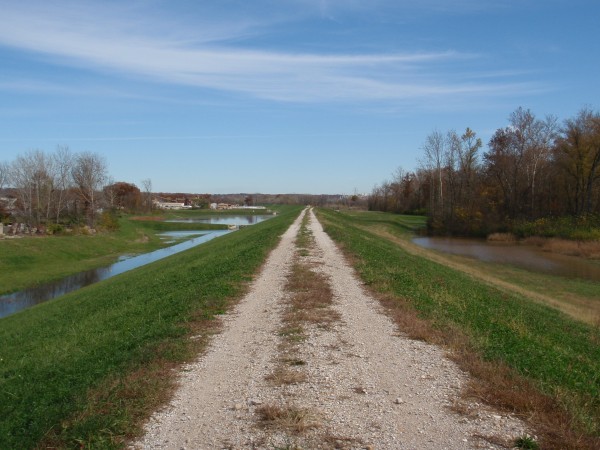As detailed in a recent report chronicling the sorry state of Berkeley County’s waterways, the people of West Virginia are learning the hard way about the negative effects of sediment runoff from gravel roads. Let’s take a look at which eco-friendly solutions they might employ to eliminate this problem.
Roads and rivers have always had a tenuous relationship at best, and gravel roads are no exception to the rule. The sediment runoff associated with this material has been linked to flooding and a decline in water quality in the area, with adverse effects felt in both nearby communities and larger towns near the coast. Several studies and reports have suggested that the safe maintenance of gravel roads is no small issue, as the very existence of the surrounding ecosystems could be at stake.
Berkeley County: Watersheds at Risk
An in-depth examination of eight gravel roads in the Tuscarora Creek and Mill Creek watersheds has revealed the extent to which sediment runoff impacts the area’s waterways. The Journal News reported on the study, conducted by Neil Gillies of the Cacapon Institute as part of an investigation of the state of gravel roads in Berkeley County. “The most important question is does the sediment from this road section reach a stream?” states a promotional flyer (Appendix 4) prepared by Gillies. “If it doesn’t, the assessment stops. If it does, we ask 11 more questions.”
Plank Bridge Road, located in the Mill Creek watershed, scored a 66 on a scale of 1 to 100, rating the highest out of the eight roads for sedimentation potential (to be clear, a higher score is not good). The contributing factors to its total included its steep slope, soft and easily eroded stone material, and a lack of side culverts to channel the water to the road’s sides.
“We want to engage people to think about roads differently,” Gillies challenged.
Potential Consequences of Gravel Roads
In the flyer, Gillies explains how poorly maintained gravel roads can become a source of pollution. Although the damage to nearby waterways and the danger to aquatic habitats figure most prominently in the publication, the author also highlights how unchecked erosion can raise the stream beds and lead to flooding risks.
He warns that, besides damaging Berkeley County’s local waterways, sediment can also affect bigger bodies of water, such as the Potomac River and the Chesapeake Bay, located hundreds of miles downstream.
According to a Pennsylvania Stormwater Management Symposium released by the EPA, gravel roads can also contribute to chemical contamination, since toxic substances like oils, nutrients, pesticides, and herbicides are known to bind to dust and sediment, polluting the streams.
Gillies also cites the creation of fine dust on gravel roads as a cause of potentially serious health problems. According to a report from the World Bank, dust that enters into the lungs severely increases health risks to the respiratory system. The young, the elderly, and those with pre-existing cases of asthma and heart or lung disease are particularly susceptible to serious long-term problems.
Cost-Effective, Environmentally Safe Maintenance of Gravel Roads
Not only do gravel roads potentially damage streams and cause health problems, but they also raise the costs of road repair and water treatment. According to the Gillies, poorly maintained roads require new material, funded both by “public money for public roads” and “private money for privately maintained roads and driveways.” The flyer reports that “improperly maintained D&G roads have real costs on our environment and our wallets.”
By utilizing Midwest Industrial Supply, Inc.’s dust control and soil stabilization products, which have been tested and certified according to U.S. EPA guidelines, communities such as Berkeley County can maintain cost-effective gravel roads without harming the environment. Midwest is also proud to offer a Managed Services Program, which includes a thorough evaluation and site-specific analysis to complete turn-key application.
Amongst the dust control products that Midwest offers, Soil-Sement® has been proven the most effective — and cost-effective — for controlling PM10 and PM2.5 dust emissions from flowing into streams and rivers. Soil-Sement provides a powerful means of erosion control through a polymer emulsion and reinforces the road surface by preventing water from destabilizing the dirt or gravel top layer.
Midwest’s Fines Preservation™ Program also provides non-toxic products based on a binder-enhanced synthetic fluid that lock and bind aggregate fines on the road together, preventing them from escaping as dust. Two products, EK35® and EnviroKleen®, effectively capture generated fines, regardless of the weather, and have been proven to reduce dust by 80% for up to four years.
Gravel roads are indispensable for communities with tight budgets, yet without proper maintenance they carry a risk of harming the environment. But with Midwest’s dust-reduction and soil-stabilization technology, communities like Berkeley County can keep their gravel roads in good shape without having to fear adverse environmental, health, or financial risks.


